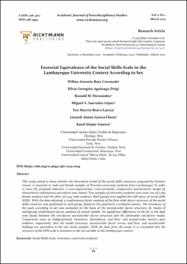Factorial Equivalence of the Social Skills Scale in the Lambayeque University Context According to Sex

Ver/
Descargar
(application/pdf: 453.3Kb)
(application/pdf: 453.3Kb)
Fecha
2023-05-05Autor(es)
Ruiz Coronado, Willan Antonio
Aguinaga-Doig, Silvia Georgina
Hernández, Ronald M.
Saavedra-López, Miguel A.
Bravo Larrea, Yen Marvin
Garcia Flores, Lizzeth Aimee
Llopiz-Guerra, Karel
Metadatos
Mostrar el registro completo del ítemResumen
This study aimed to show whether the theoretical model of the social skills construct, proposed by Gismero (2000), is invariant in male and female samples of Peruvian university students from Lambayeque. In order to meet the proposed objective, a non-experimental, cross-sectional, comparative psychometric design by hierarchical confirmatory procedures was chosen. Two samples of university students were used, one of 1,084 female students and the other of 1,043 male students. Both groups were applied the self-report of social skills (EHS). With the data obtained, a confirmatory factor analysis of the first-order factor structure of the social skills construct was performed in each group, based on the polychoric correlation matrix. The invariance of the scale according to sex was evaluated on the basis of the second-order factor structure, by means of multigroup confirmatory factor analysis of nested models. No significant differences in the fit to the data were found between the two-factor second-order factor structure and the alternative one-factor model. Consecutive tests of configurational invariance, disturbance, and first- and second-order metrics gave evidence, respectively, that the model structure, second-order factor errors, and first- and second-order loadings are equivalent in the two study samples. With the data from the study, it is concluded that the structure of the EHS scale is invariant to the sex variable in the Lambayeque context.
Palabras clave
Colecciones
- SCOPUS [380]

